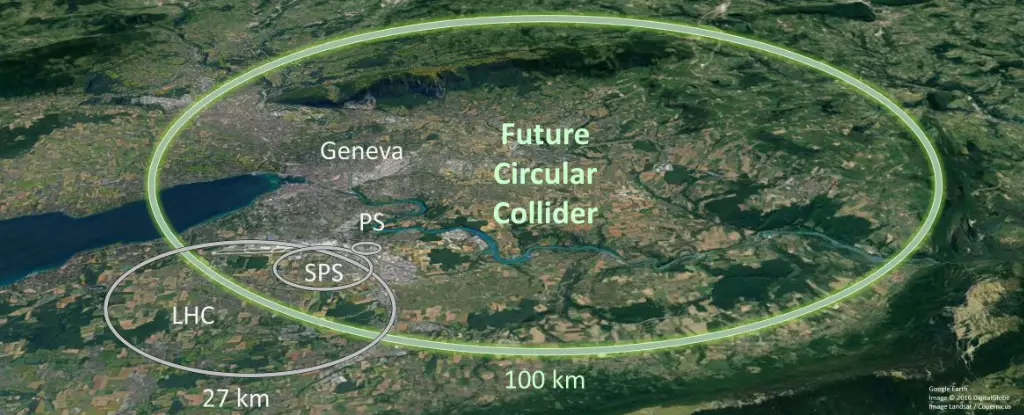The Future Circular Collider (FCC) is poised to become the world’s most ambitious particle collider, promising to usher in a new era of scientific discovery and reaffirm Europe’s position as a bastion of fundamental physics. However, this colossal $17 billion investment not only raises questions about scientific innovation but also ignites a heated debate surrounding its implications. CERN Director Fabiola Gianotti describes this project as an essential step for Europe to maintain its competitive edge against nations like China, emphasizing the urgency behind securing funding from member states.
Yet, the sheer scale and expense associated with the FCC project has drawn skepticism and criticism. The plans to construct a massive underground tunnel approximately 200 meters deep, stretching over three times the length of the current Large Hadron Collider (LHC), lead one to question whether the potential scientific gains justify the financial and environmental costs. Critics are right to challenge such “pharaonic” ambitions, as underlying them is a fundamental tension between advancing human knowledge and addressing pressing contemporary issues.
The Scientific Promise vs. Real-world Consequences
Supporters of the FCC, including scientists from prestigious institutions like the L2IT lab at Toulouse University, assert that breakthroughs in understanding the universe’s origin hinge on this project. The quest to explore phenomena like the Higgs boson, often referred to as the “God particle,” underpins much of modern physics—controlled collisions at unprecedented energy levels promise findings that could revolutionize our understanding of matter and energy. However, these high hopes must be examined against the backdrop of escalating environmental concerns and the lives impacted by the construction.
Local residents, such as French dairy farmer Thierry Perrillat, describe the project as a Goliath set to consume their land and alter their livelihoods. It is a classic narrative of progress clashing with local interests. The harsh reality is that behind these grand ambitions lie people grappling with potential displacement. It begs the question: is scientific advancement worth the price of uprooting communities and destroying local economies?
The Dilemma of Resource Allocation
As Germany expresses reservations about funneling substantial sums into the FCC, a critical point arises concerning the allocation of resources. The potential for funding smaller scientific projects offers an appealing alternative to the financial black hole that a monumental endeavor like the FCC represents. Physics is no less important when facilitated through smaller-scale innovations that can also be scientifically significant. This divergence in priorities shines a spotlight on the skewed incentives that seemingly prioritize grandiosity over practicality.
CERN representatives have attempted to quell these concerns by claiming that their organization’s budget could cover up to 80 percent of the FCC’s costs. However, such assurances do little to alleviate the anxiety felt by residents and environmental groups, who are concerned about the ongoing financial burden and damage this project may inflict on ecosystems. The electricity consumption alone raises sustainability questions; what price do we pay for understanding, and is it a cost society can truly afford amidst a growing climate crisis?
The Environmental Imperative and Local Resistance
Local opposition gains momentum, where grassroots movements like Franco-Swiss collective CO-CERNes unite residents against the backdrop of CERN’s ambitions for progress. Engaging communities through informational sessions, these activists ask us to reconsider our investment priorities in light of the ecological impact. Despite assurances from CERN that designs have been improved to mitigate environmental consequences, skepticism remains pervasive. Energy efficiency seems inadequate in contrast to the overarching vision of the FCC.
Those opposing the FCC articulate a valid perspective: given the current state of our planet, is it wise to expend vast resources on an ambitious scientific project with uncertain outcomes? Community members like Kevin Mugnier, newly informed of the FCC’s potential encroachment on their land, express profound unease. This vulnerability underscores a broader societal challenge: balancing scientific aspirations with the ecological and residential realities on the ground.
Balancing Progress and Local Priorities
As debates unfold, the contrasting opinions of local leaders like Ferney-Voltaire Mayor Daniel Raphoz reflect the complexity of the issue. While he champions the FCC as a potential boon for employment and resource utilization, the valid concerns surrounding the project’s ramifications for local life cannot be dismissed outright. The narrative of scientific progress often clashes with personal stakes, a dichotomy seen throughout modern history.
In the end, this monumental project shines a light on a fundamental question facing society today: how do we define progress? Is it the pursuit of groundbreaking knowledge, no matter the cost, or is it a more grounded approach that prioritizes community welfare and environmental sustainability? The Future Circular Collider represents not just a scientific ambition but a litmus test for our values moving forward, urging us to reconsider what advancements we are willing to pay for—both financially and ethically.

Leave a Reply